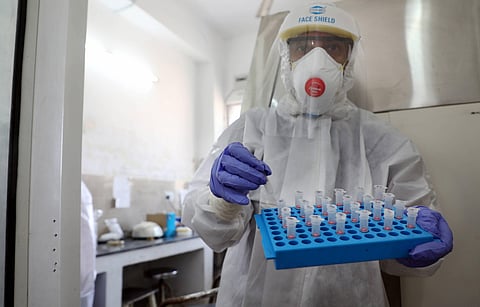

NEW DELHI: Niti Aayog member Dr V K Paul on Friday apologised for “misconception” regarding an official graph he had presented earlier that suggested India would have no new COVID-19 case by 16 May. However, he insisted that the government never said the coronavirus cases will be zero by a particular date.
During the health ministry’s daily briefing on April 24, Paul had presented the graph seeking to highlight the benefits of the nationwide lockdown. One of the slides showed the curve of active cases plummeting to zero by May 16.
However, on Friday, he claimed there was no mention of zero word on the graph.
“Even I never said the cases would be zero by a particular date,” he added, while responding to a question at the press briefing.
Paul said the graph presented last month was based on mathematical data. While he apologised for the ‘misconception’, he said “we showed you factual information and no claim was made ( regarding the number of cases falling to zero)”.
“It was a mathematical trend line…Neither the graph nor my speech mentioned that the cases will be zero, please let it be clarified. I want to clear this and if there was any misconception, I want to apologise,” Paul said.
Paul on Friday also said the lockdown, which is about to complete two months, cannot go on indefinitely and it has achieved its purpose by giving the nation enough time to ramp up the health infrastructure and raise awareness about the pandemic.
Responding to a question on whether relaxations allowed in the fourth phase of the lockdown, which includes a partial resumption of domestic flight services, would hurtle India back to square one in its fight against COVID-19, chairman of Empowered Group One and Niti Aayog member V K Paul said the lockdown was a special effort, meant for a purpose, and it cannot continue for an indefinite time.
The government has formed 11 empowered groups to suggest measures to ramp up healthcare, put the economy back on track and reduce misery of people once the lockdown is lifted.
The government imposed a lockdown on March 25 and it is currently in its fourth phase.
Paul said a large number of deaths were averted due to lockdown, which put a brake on the spread of the virus.
"It cannot continue for unlimited time and life has to return to normal as livelihoods have been affected," he said, stressing it's important to exhibit a behaviour that creates difficulties for the virus.
"Now we know what can save us, we need to be vigilant and respond accordingly," he added.
Paul said the virus has a nature of spreading exponentially.
But after April 3 there was a steep decline and the case growth per cent dropped to 5.5 by May 13 from 15-22 per cent earlier as the lockdown stopped the speed of increase of cases, he said, adding the doubling time of the cases has now improved significantly to 13.3 days from 3.4 days before lockdown.
Paul, however, cautioned against relaxing the lockdown, and said, "If we relax, the virus will spread."
"The confinement of COVID-19 to certain areas has been due to the actions taken during the lockdown. It prepared us for future," he said, referring to the ramping up of the health infrastructure.
As many as 1,093 dedicated COVID facilities and around 1,85, 306 beds have been prepared for the treatment of COVID-19 patients.
Also 2,403 dedicated COVID-19 health centres with oxygen facilities having a capacity 1,38,652 isolation beds have been readied, he said.
Also, Aarogya Setu is an unequalled weapon against the disease, Paul said.
"The time the nation got for preparedness due to lockdown has been utilized very well, we can now say with confidence that we will be able to face the challenge and surmount it," he said.
(With PTI Inputs)